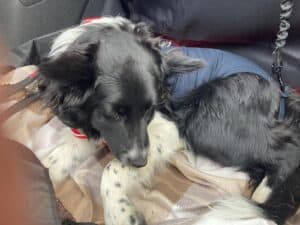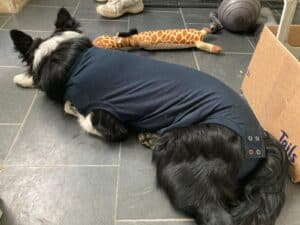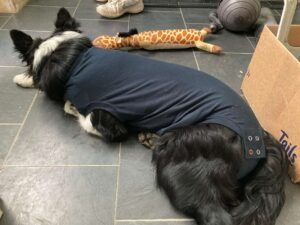Some dogs suffer from anxiousness, as experienced with a family border collie. Bertie came around from anaesthetic too quickly, resulting in short-term aggression and acute anxiety.
Castration is a surgical procedure performed under anaesthetic. Without the hormone testosterone, it reduces a dog’s sexual drive and self-confidence. As a result, other dogs will no longer be seen as competition and the threat of aggression will be removed, together with other testosterone-related behaviours. But, this procedure can affect nervous, shy dogs differently. For example, Bertie ‘came round’ from anaesthetic too quickly at the veterinary practice. He became highly anxious, whimpering and insecure, returning to a highly anxious state. As well as hormone changes, he was dressed in a pet shirt and later an Elizabethan collar. In short, he reacted with a type of panic attack for 72 hours, frightening for his own to see. So, we can prepare our canine friends to a degree of pre-castration, please continue reading.
A dog’s general personality will remain unchanged without testosterone. But the after-effects for each canine differ. And another point to mention is that neutering may not be a simple solution if your dog is still a boisterous adolescent. The unruly behaviour could be because your dog not receiving enough mental and physical stimulation. This is apparent in breed-specific dogs such as the border collie. If the lack of stimulation is the cause of bad behaviour (this can be because of circumstances out of the owner’s control), the dog could be at risk of being rehomed or euthanised by some owners. So as you can see, castration may not automatically calm some dogs.
Update November 2022: Since writing this article, I have written about Trigger stacking in Border Collies and other breeds, and I believe Bertie may have suffered post-op stress, combined with wearing the medical shirt.
You can train your dog to cope with the post-op
Behavioural signs that a dog needs neutering
Firstly, as dog owners, we have noticed that professionals and other owners suggest different ages for neutering. The average age is between six to nine months old. It also depends if your dog has a nervous deposition. Some vets may recommend waiting.
Over-aroused dogs will display the following sexual-driven behaviour associated with testosterone.
- Separation anxiety
- Guarding issues
- Increased aggression towards owners, other people and other animals
- The time it takes for a dog to calm down is significantly longer
- Roaming in search of bitches in heat (they will pick up the scent even if the bitch is miles away)
- Creating extreme mayhem to reach a bitch in heat
- Rolling in wild grass during fox mating season (December to March)
- Anxiety and fear behaviour
- Marking territory by urinating (this can be in your home)
- Humping toys, furniture and you
- High arousal state
- Noise sensitive
How to train your dog to cope post-surgery

I have never considered this, but preparation can be the key if you think your dog may not cope with certain aspects of post-surgery. It is like preparing your dog for a long car journey. Train him with short trips first and build it up. So why not prepare your dog for post-neutering surgery?
Here are ways to train your dog before surgery:
- Purchase an Elizabethan Dog Collar (also known as a lampshade collar) and get your dog used to wearing it. Or try this Comfy Collar from VioVet or Kong Cloud Inflatable.
- Ask your vet if they plan to place your dog in a Medical Pet Shirt, also known as a recovery shirt. There is a shirt available for cats too
- Purchase beforehand and dress your dog in it. You can then return it to the practice when your dog is admitted for neutering
- Get your dog use to being back in his pen, in a quiet room, with food and water and away from other animals
- Handle your dog in different ways in readiness of the same by your vet
- Perhaps try your dog in a muzzle
The above training is meant for short periods only. Remember to praise your dog with his favourite treat after completing the above.
What is testosterone in male dogs
Testosterone is a confidence-building hormone that increases sex drive.
When your dog is neutered, the testicles are surgically removed – these testicles made the testosterone but stopped producing post-operation.
But, despite the confidence-building hormone no longer being present, neutered dogs can develop a rise in aggression or behavioural issues. These are based on feelings of fear.
If your dog suffers from anxiety or nerves or is timid, he might develop deeper fearful behaviours because the hormone has been removed. So your dog may want to push you or a dog or child away aggressively because they are frightened of a situation and being hurt.
This will differ dog to dog.
What is hyperarousal in a dog?
You may notice that you are unable to calm your dog down. Or that your dog seems not to have the ability to calm himself down. So when playing games, a dog’s cortisol and adrenaline will peak.
A dog coping after surgery without pre-op training

As mentioned before, not every dog is the same.
Bertie, a 7-month old border collie, reacted fearfully post-neutering. Before the operation, he was never an overconfident dog, nor was he timid but he is above average intelligence and had typical Border Collie naughtiness. The issues began at the veterinary practice.
Bertie ‘came round’ from the anaesthetic on the table too quickly. From here, he developed high anxiety. So, Bertie was given recovery time at the veterinary practice before going home.
Bertie was dressed in an all-in-one pet shirt for post-operation management (review to follow). This comprised of a popper section below his tail. There was no opening for his genitals, so if Bertie wanted to urinate or poop, he had to do so within his pet shirt. Back home, Bertie was insecure, clingy and whimpering.
His vet prescribed Loxicom, an anti-inflammatory as 1ml per day for 5 days. He was also prescribed Tralieve as 0.75 tablets up to every 8 hours. Tralieve is to reduce chronic mild soft tissue and musculoskeletal pain.
Overnight Bertie had urinated inside his pet shirt and became severely agitated, snapping so much that Anita could not go near him to remove the shirt and clean him actively. In the end, it took two people. First, Bertie had to be cut out of the shirt. Next, Anita replaced the pet shirt with an Elizabethan collar. However, Bertie destroyed it.
About 72 hours later, Bertie began calming down. Now he is back to normal combined with border collie antics. It was extremely shocking and worrying for Anita.
We can only use Bertie as a possible example of a nervous dog becoming fearful with fear-based aggression resulting from removing the testosterone hormone.
Related Questions
How do I take care of my male dog after neutering?
Instil quietness in the household. This is not always easy with children and other pets.
1: Set up a quiet room away from other pets in your home. If another pet approaches your dog, it may become nervous because it senses changes in behaviour and scent.
2: Your vet will ask you to walk your dog in short bursts for two weeks. Keep to this. They are professionals. Equally, stop your dog from boisterous activities such as running about indoors or in the garden. And stop any jumping about too.
3: Keep your dog away from bitches on heat for a period. Finding a place to walk where you rarely meet many dog walkers might be a good idea.
4: Monitor your dog for any health or medical issues. This can be emotional. Your dog may become clingy having been away from you. He may be uncomfortable wearing a pet shirt or collar. His hormonal feelings have changed – he may feel the effect.
5: Keep checking the incision if you can. Does it look clean? Is your dog in pain? During COVID-19 restrictions, your vet may ask for a photograph of the incision rather than you visit the practice. Your dog needs to be calm for you to do this; don’t forget.
How long do dogs take to recover from castration?
Normally a week or two. Yes, dogs can act strangely after neutering; Bertie is an example. I mentioned the effect of testosterone following neutering. Bertie initially became very clingy and whimpering when he arrived home. His vet dressed him in a pet shirt. There weren’t any openings for his bottom or penis, so Bertie had to defecate inside it. This left him during the night. There were poppers to the base where his tail is. The next day came fear-aggressive (not dangerous aggressive). He had to remain in his pen as they couldn’t go near him. Eventually, we removed the pet shirt with two people, but he had a be cut out of it. He then wore a lampshade collar and progressed to rip it apart. This extreme out-of-character behaviour continued for at least 72 hours. My sister learnt Bertie was snappy post-surgery at the veterinary practice and explained they had never experienced it. I am surprised they did not explain the possible effects of testosterone removal on already less confident dogs.
So when you bring your dog home and place it in a quiet place, consider putting it into its pen initially. Be patient. Give your dog time to adjust to new feelings. It is likely fearful behaviour and hyperarousal caused by neutering.
Disclaimer
If you have any concerns about your dog or puppy, please seek veterinary advice in the first instance.
Poppys Pets is a participant in Awin and Amazon Associate affiliate programs which compensates me for referring traffic. It is of no extra cost to you and if thinking of buying a product, please consider using my link. It\'ll earn Poppy\'s Pets a few pennies to continue to this website. Only a selection of articles and videos on this website and YouTube channel contains affiliate links. Further information: Disclaimer and Privacy Policy

